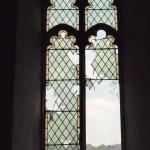
Someone on the Tippling Philosopher atheist blog that I frequently visit who brought up the point that the Bible and/or Catholicism requires an “anthropological universality” in the Flood (meaning that all the human beings in the world were in the Mesopotamian floodplain in c. 2900 BC and were wiped out, save for those in the ark).
The Catholic Encyclopedia in it’s article, “Deluge” in 1908 indeed espouses this view. But it’s not authoritative or magisterial (i.e., not binding on Catholics). I just asked a theologian friend of mine (Dr. Robert Fastiggi) who worked on the latest version of the best source of explaining the various levels of authority of Catholic dogma (Heinrich Denzinger, Enchiridion Symbolorum: A Compendium of Creeds, Definitions, and Declarations of the Catholic Church [San Francisco: Ignatius Press; 43rd edition: September 1, 2012; revised by Peter Hunermann; partially edited and translated by Robert Fastiggi and Anne Englund Nash]), and he clarified that Catholics are not required to accept anthropological universality as part of Catholic dogmatic belief.
That is, Catholics can have different opinions on the question and follow secular science, history, anthropology, archaeology, etc., to where they lead us. I was happy about that because it corresponded with my own inclinations and suspicions related both to history / archaeology and Catholic dogma.
Clarifications in this regard were made by the Biblical Commission of the Church in January 1948 and in Ven. Pope Pius XII’s encyclical Humani generis in August 1950. These clarifications / modifications of prior prevailing views (and allowance of different ones) also prove once again that the Catholic Church is open to science and is willing to even modify its best understanding of the Bible as a result of further understandings and discoveries. And that’s exactly as it should be.
Protestantism, for the most part, takes the same general view of the relationship of science and Scripture, but there are those (albeit a tiny — though very vocal and visible — number in Protestantism and even smaller number in Catholicism) who hold to older traditions and so believe in a universal Flood (i.e., water covering the entire earth to a depth higher than Mt. Everest’s elevation), a young earth (6-10,000 years), flood geology (or “catastrophism”), a literal six-day creation, complete denial of any aspect of evolution (even theistic evolution), etc.
Here are the relevant documents:
Letter of the Secretary of the Biblical Commission to Cardinal Suhard, Archbishop of Paris, January 16, 1948
3864 The question of the literary forms of the eleven first chapters of Genesis is far more obscure and complex. These literary forms correspond to none of our classical categories and cannot be judged in the light of Greco-Latin or modern literary genres. One can, therefore, neither deny nor affirm their historicity, taken as a whole, without unduly applying to them the canons of a literary genre within which it is impossible to classify them. If one agrees not to recognize in these chapters history in the classic and modern sense, one must admit that the current scientific data do not allow giving a positive solution to all the problems they pose.
The first duty here incumbent upon scientific exegesis consists above all in the attentive study of all the literary, scientific, historical, cultural, and religious problems connected with these chapters; one should then examine closely the literary processes of the early Oriental peoples, their psychology, their way of expressing themselves, and their very notion of historical truth; in a word, one should collate without prejudice all the material from the palaeontological and historical, epigraphic, and literary sciences. Only thus can we hope to look more clearly into the true nature of certain narratives in the first chapters of Genesis.
To declare a priori that their narratives contain no history in the modern sense of the term would easily convey that they contain no <history> in any sense, whereas they relate in simple and figurative language, adapted to the understanding of a less developed people, the fundamental truths presupposed for the economy of salvation as well as the popular description of the origin of the human race and of the chosen people. (pp. 794-795)
***
Ven. Pope Pius XII: Encyclical Humani generis, August 12, 1950
3898 Just as in the biological and anthropological sciences, so also in the historical sciences there are those who boldly transgress the limits and safeguards established by the Church. In a particular way must be deplored a certain too free interpretation of the historical books of the Old Testament. Those who favor this system, in order to defend their cause, wrongly refer to the Letter which was sent not long ago to the archbishop of Paris by the Pontifical Commission on Biblical Studies [see part of it above]. This letter, in fact, clearly points out that the first eleven chapters of Genesis, although properly speaking not conforming to the historical method used by the best Greek and Latin writers or by competent authors of our time, do nevertheless pertain to history in a true sense, which, however, must be further studied and determined by exegetes; the same chapters <the letter points out>, in simple and figurative language adapted to the mentality of a people but little cultured, both state the principal truths that are fundamental for our salvation and also give a popular description of the origin of the human race and the chosen people.
If, however, the ancient sacred writers have taken anything from popular narrations (and this may be conceded), it must never be forgotten that they did so with the help of divine inspiration, through which they were rendered immune from any error in selecting and evaluating those documents.
3899 Therefore, whatever of the popular narrations have been inserted into the Sacred Scriptures must in no way be considered on a par with myths or other such things, which are more the product of an extravagant imagination than of that striving for truth and simplicity which in the Sacred Books, also of the Old Testament, is so apparent that our ancient sacred writers must be admitted to be clearly superior to the ancient profane writers. (pp. 807-808)
***
Here are two exchanges on Noah’s Flood with atheists from the aforementioned page. Words of “Lex Lata” will be in blue; those of Geoff Benson in green.
I’m certain Armstrong understands that a local flood means most of the human race wasn’t impacted, and there can’t have been an eight-person bottleneck. It’s beyond reasonable scientific and historical dispute that we H. sapiens resided on countless islands and every continent except Antarctica ca. 3000 BCE, and still did ca. 2800. We were utterly not wiped out.
Even in southern Mesopotamia, any destruction cannot have been civilization-ending. The Sumerians there were farming, building, writing, fighting, and worshiping their gods ca. 3000, and farming, building, writing, fighting, and worshiping their gods ca. 2800. Was there occasional local flooding, sometimes even catastrophic to certain communities? Of course; lower Mesopotamia is a big, relatively flat drainage basin, and we have evidence of local floods, both ancient and modern. Was there one massive regional deluge that wiped out the entire Sumerian population, from Eridu in the south to Kish in the north? Absolutely not. Which kinda puts another wrinkle in the narrative.
* * *
THE LORD: Noah, humanity’s wickedness and violence have made me heartsick, so I will send a great flood to cleanse the earth. But you, righteous Noah, have found favor in my sight. So you will build an ark, and survive the deluge with your household.
NOAH: Glory to you, Lord. Great is your wrath, but greater is your mercy. I will build this ark, so that I and my family alone may avoid the destruction you are visiting upon all other human beings.
THE LORD: Well, to be precise, not all other human beings. I mean, this is kind of a regional flood. Most people in existence won’t be killed. Or even get wet, really. At least not from this.
NOAH: . . . . Oh. Still. You are wise beyond wise, Lord, and who am I to question your ways? I will build this ark, so that I and my family alone may avoid the destruction you are visiting upon . . . all other Sumerians in southern Mesopotamia?
THE LORD: Yeah, this is actually a little awkward. I wouldn’t say all the other Sumerians. Maybe most. Well, no, let’s go with a lot. A lot. Definitely. Some. I’ll figure it out.
NOAH: Okaaaay. Just curious. Will the other surviving Sumerians also have to build arks, and cram into them with their families and livestock for weeks or months?
THE LORD: Ha! No, no. They’ll be able to get to high ground, or just not be flooded to begin with.
NOAH: Huh. I’m sure I’ll regret asking this, but are they more righteous than I, and have they found greater favor in your sight?
THE LORD: No, not particularly. I just . . . y’know. [THE LORD SHRUGS.]
NOAH: Wow. I get the distinct impression you haven’t really thought this through.
THE LORD: I have not. Get to building.
Short reply: Hebraic idiom uses a lot of exaggeration. “All” is oftentimes not intended to be literally all. So it’s a question of how to interpret the language in the narrative of the Flood. I go into this in great depth in my paper, Local Flood & Atheist Ignorance of Christian Thought.
Even you (one of the more insightful and thoughtful folks here: I mean that sincerely) descend to jokes and mockery [ha ha ha ho ho]. All this shows is that you are insufficiently acquainted with Hebrew idiom and figures of speech: of which there are over 200 in the Bible: and with many sub-categories as well.
Thank you for the kind words.
As for your local flood theory, I ain’t got time to write “point-by-point” thoughts about every point in one blog post (much less three). But I don’t mind temporarily assuming arguendo that the general contours of your theory are roughly correct. From the subjective perspective of a survivor, a sufficiently catastrophic local deluge might appear to extend to the horizon–or do so in later human remembering and retellings. And we know that catastrophic floods sometimes occur in the Mesopotamian region, and did so in antiquity, hitting certain communities especially hard. As for possible and specific depth, volume, duration, etc.–those are largely speculative variables about which this non-hydrologist and non-meteorologist is confidently and contentedly agnostic. Y’all knock yourselves out debating rainfall and line-of-sight.
And frankly, I think they’re peripheral to the material literary and theological meaning of the Mesopotamian flood tradition (whether we’re talking about Ziusudra or Noah or whomever). The Powers That Be get angry at the incorrigible human race. They drown everybody, except a righteous, determined, vessel-building man and his household. They express remorse. There is reconciliation with humanity, and a vision of hope. That’s the important stuff, whether one reads the text as a Campbellian heathen like me, or as a believer like you.
In any event, switching to history, we can probably agree on a few points, if we assume that a specific local flood in southern Mesopotamia ca. 2900 is the basis for the tradition reflected in Genesis.
1. The flood killed a small fraction of the human beings then in existence on the planet.
2. The flood killed an even smaller fraction of the plants and animals then in existence on the planet.
3. The flood might’ve been particularly devastating to one or more specific Sumerian communities, but did not wipe out all the Sumerians and all their urban centers in southern Mesopotamia.
4. If there was a Ziusudra or Noah or etc., he and his family were a miniscule fraction of the human beings still alive when the flood ended, and were in no way a genetic, cultural, or religious bottleneck. (Recall our chat about the Table of Nations being an authentic depiction of the Hebrew authors’ subjective worldview, but containing material historical and anthropological inaccuracies.)
5. If there was a Ziusudra or Noah or etc., he was Sumerian.
Now, a lot of those points have interesting and often problematic implications for many believers and theologians, but that’s a much longer discussion, and I’ve got to get busy not going to church this morning.
Cheers!
We can pretty much agree on those things, yes. The judgment would then be essentially upon the Sumerians under the figurative / exaggerated / non-literal Hebrew idiom of “all”: just as God judged various other groups of humans at different times.
As for possible and specific depth, volume, duration, etc.–those are largely speculative variables about which this non-hydrologist and non-meteorologist is confidently and contentedly agnostic. Y’all knock yourselves out debating rainfall and line-of-sight.
Exactly. This is why I cited a geologist and a physicist (one who co-wrote an influential article in optics that has been cited by 4,392 other scientific articles and who worked in a department of quantum mechanics). He gave a theory, backed up by complicated mathematic equations that are Greek to me. But they sure look impressive.
Jonathan has argued that we have no exact parallel of a modern storm with the [local] biblical Flood: even construed as local and involving depths of about 40-60 feet (my model). But there are some parallels (including inches of rain in a day and duration of flood waters), and I most recently argued that it’s plausible that there could be such a storm, seeing that we only have dependable records of weather since 1880 and seeing that these past 141 years are 1 / 32.23 millionth of earth’s total history. It’s very difficult to argue that in all that time a natural storm of that magnitude, causing a long-lasting flood is “impossible.” But if anyone is willing to make that silly argument, it’s Jonathan.
I think the geologist / physicist husband and wife team I cited have made a plausible argument and case: at least as far as I can understand it as a layman. And I think it could and would be fun for atheists to examine it and show us all how it is impossible. So far, no takers. Yours is the longest sustained and serious analysis so far, and even it isn’t point-by-point. But I sure do appreciate it, because it is sui generis around here so far (save for a few similar sentences from Geoff Benson).
***
I’ve read your article in full and I’m not sure it changes or challenges anything that’s been said, either on this post or previous ones. You claim that lots of the words used in bible translations can be, if not exactly mistranslations, found to have different meanings, suggesting that, for example, ‘earth’ might just mean what people could see. Okay, fair enough, with a little effort you’ve been able to show that maybe, just maybe, the bible doesn’t say what lots of people think it does. Let’s accept this is true, where does it leave God? Surely he at least inspired the words that were written down, so why didn’t he tell people who were scribbling away about the earth being ‘as far as they could see’, and tell them that no actually it’s much bigger than that, but it’s only people round here that I’m going to drown?
I’m also not convinced your local flood theory is a majority view. Many sites accuse you of being positively non-Christian for such a view, and there are numerous, significant looking sites, which claim ‘of course it was a universal flood’.
Lastly, the physical implications of a local flood are not readily dismissed. Flood water, no matter how quickly it falls, is subject to physical limits. Indeed it’s the physical movement of the water that makes flood water to be so dangerous, as it follows the physical law that water finds its own level. This happens the moment it falls, and whilst the sheer rapidity of the deluge may have caused yet more localised extreme flooding, this could not have been widespread, given the terrain. It certainly could not have produced depths sufficient to float a boat the claimed size of the Ark for any significant period of time (though the suggestion that it could have matched anywhere near the size of more modern steel ships is fallacious).
Just my thoughts.
I appreciate the openness in your first paragraph. Kudos.
The last paragraph is dealt with at length in my extended argumentation for a local Flood, enlisting the aid of a geologist and physicist.
***
Photo credit: [PxFuel / free for commercial use]
***
Summary: Catholics are not required (as a matter of dogma) to believe that Noah’s Flood was “anthropologically universal” (i.e., that it killed ALL the non-Ark people on the earth).













